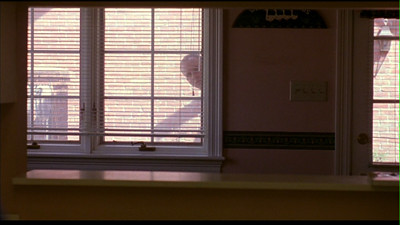
Revisiting another old piece of writing, studying another favorite contemporary director.
When Steven Soderbergh's Schizopolis came out on DVD in 2003, I reviewed it for the Oni Press newsletter we sent out every week. In keeping with the cheeky nature of the movie, I wrote a straight review, but then I ran it through Babelfish or some other online translator, and sent out the review in Portuguese, with only an English tag on the end:
Steven Soderbergh é quase como o equivalente do filme de um criador dos comics do indie. Escarranchando linha entre far-afield creativo anarchy de independente retrato gosta LIMEY e mainstream glitz como OCEAN'S 11, segura um ou outro lado do arco do retrato de movimento com aplomb igual, a maneira a, deve nós diz, Greg Rucka pode mover-se da RAINHA & do PAÍS e QUERER SABER A MULHER e fazê-la parecer tão effortless quanto pode ser.
Naturalmente, se todo o you'd visto for 1996's SCHIZOPOLIS, o you'd não tem nenhuma maneira de saber isso. Este é Soderbergh's a maioria de película do out-there. Compreendido de três seções que reapproach a mesma história dos pontos diferentes também de lançar view--while para fora dos apartes que critiquing a religião do consumerism e de um precursor à sorte do "extreme" comportamento que typify nossas fatias diferentes atuais dos culture—it's do entertainment do JACKASS arguably de Soderbergh's para possuir a mente. A natureza de It's muito mostra como louco é, portraying masturbating, moldando sua própria esposa como a mulher ele simultaneamente fraudes sobre e tem um caso com, aparentemente salpicando a saliência witless' dialogue com as linhas dos he's das notas começados dos executivos do estúdio do filme. Soderbergh ele mesmo introduz a película, e com o ar de hubris sly, double-edged, di-lo se você don?t o começar, it?s sua própria falha, não his. E em muitas maneir!
as, é direito. Você aren't que vai começar-lhe todos os primeiros it's do time--and sua própria falha se você tentar do sustento do don?t. Porque você deve realmente.
And, of course, when you see it, suddenly this will make sense, too.

I have since misplaced the original text. I might have it on a disc somewhere, but I am too lazy to hunt for it. Instead, I'll just run it through Babelfish again:
Steven Soderbergh is almost as the equivalent of the film of a creator of comics of indie. Sitting astride creativo line between far-afield anarchy of independent picture likes LIMEY and mainstream glitz as OCEAN'S 11, insurance one or another side of the arc of the picture of equal movement with aplomb, the way, must we say, Greg Rucka can move of the QUEEN & of the COUNTRY and FONDNESS TO KNOW the WOMAN and to make it to seem effortless so how much it can be. Of course, if all you'd seen will be 1996 ' s SCHIZOPOLIS, you'd does not have no way to know this. This is Soderbergh's the majority of film of out-there. Understood of three sections that reapproach the same history of the different points also to launch view--while for is of the aside remarks that critiquing the religion of consumerism and of a precursor to the luck of it "it distinguishes" behavior that typify our current different slices of culture-it's of entertainment of the JACKASS arguably of Soderbergh's to possess the mind. The nature of It's very shows as wild it is, portraying masturbating, molding its proper wife as the woman it simultaneously frauds on and has a case with, pparently sprinkling the salience witless' dialogues with the lines of he's of started notes of the executives of the studio of the film. Soderbergh he himself introduces the film, and with the air of hubris sly, double-edged, say it if you don? t starting, it? s its proper imperfection, not his. E in much maneir! , he is right. You aren't that it goes to start all to it first it's of the teams--and its proper imperfection if you to try of the sustenance of don? t. Because you really must.

Wow, you'd think if the internet did the original translation, they'd know how to put it back. No such luck. I am pretty sure "FONDNESS TO KNOW the WOMAN" is actually Wonder Woman, which Greg Rucka was writing at the time, but boy oh boy, talk about getting lost in the translation.
As a goof, though, I still think it fits well with Soderbergh's movie, a scattershot string of improvisations and formalist exercises that the director fashioned into a thought-provoking comedic narrative. A large part of the fabric of Schizopolis is about language as a tool of communication, be it honest or deceitful. The way people talk is warped throughout the movie. There are scenes of a husband and wife speaking in literal phrases of intent, breaking down their words to the meaning beneath the outward expression; multiple segments where an exterminator converses with his sexual conquests using random exclamations, the duos sounding like refugees from spy movies; the male members of a love triangle talk in Japanese and Italian (and later, a third member in French) while the woman between them speaks in English. They all understand each other just fine, and though the viewer's instinct is assume he or she is missing something, everyone watching really understands, too. There's no confusion about what is going down--which is just what Soderbergh was hoping.
These are intellectual pranks in a film full of egghead jokes and self-reflexive stunts. Schizopolis is a freeform experiment in smarty-pants comedy, borrowing its style and structure from Monty Python, the Monkees movie Head
Schizopolis was made off the beaten path after the one-time wunderkind had suffered a series of defeats following his much-lauded debut, sex, lies, and videotape

Throughout, Soderbergh deconstructs scenes the way he deconstructs language when the married couple speaks in intentions rather than accepted terminology. Some of the characters have names that sound like the descriptive credits of minor players at the end of movies, be they direct like Attractive Woman #2 or absurd like Nameless Numberhead Man. Soderbergh even correctly guesses some of the trends that would take over Hollywood, including Scientology (here called "Eventualism") and reality television. The exterminator, named Elmo Oxygen and played by David Jensen, becomes the star of a guerilla filmmaking project where he goes around beating on people and pulling mean-spirited stunts. Another mirror being held up to the movie we are watching?

More self-reflexiveness: Soderbergh plays the husband, Fletcher Munson, and the wife is played by his ex-wife Betsy Brantley; the real-life estranged couple playing a fictional estranged couple. This makes it more than a casual joke when a second Soderbergh character breaks through the illusion to realize he is having an affair with his own spouse. In a way, that's what's really happening. Schizopolis often doubles up on characters and concepts. The workers at Fletcher's office, which happens to be the local headquarters of Eventualism, believe that there is a spy and a mole within the company, despite being words for the same thing. The term "spy" was only introduced becuase someone was trying to explain what a mole was. Soderbergh slyly makes another movie joke and references the Kevin Costner thriller No Way Out
here by suggesting that the spy and the mole actually are one in the same, a dirty trick where the interloper will never be found because he is searching for himself.

Which could also sum up Schizopolis, especially since the transition between the first and second act (clearly numbered by Soderbergh) is a neo-Bunuelian device where Munson discovers his own doppelganger, the dentist Dr. Jeffrey Korchek, also played by Soderbergh; of course, he's the man that's having an affair with his own wife. That realization comes as the identities pass between the copycats, a kind of mind-meld where Munson knows he is Korchek and vice versa, two sides of one split personality. The editing in the sequence where Munson looks through Korchek's window is amazing, a series of cuts moving around Munson in a circle, capturing him at different angles and distances. There are other such realizations of self in Schizopolis, wherein movie montages make fantasy lives visible, Munson and Korchek seeing what their different possible choices would lead to, their potential lives flashing before their (and our) eyes. Adding further to the layers, not only does the director play his own characters, but Munson is also a speech writer for the head of Eventualism, and as he writes the words his boss will say, Munson becomes him, too.

Yes, it's confusing when you lay it out like that, but Schizopolis keeps up a breakneck pace that makes it nearly impossible to pause for reflection. It's a technique Soderbergh borrowed from Richard Lester: if the audience's main concern is just keeping up with you, then they aren't going to get caught up in how absurd everything is. I think if you did, Soderbergh could turn it back on your anyway. Schizopolis is its own moebius strip, a movie about itself by a filmmaker in conversation with himself. On the DVD, quite literally; as it turns out, Soderbergh has recorded a commentary where Soderbergh interviews Soderbergh. He plays the two distinct roles, interviewer and interviewee, asking himself questions and answering them. Granted, the information revealed is often dubious, but that's not the point, is it? Where else do you expect truth? In Eventualism's message of self-actualization? Not likely!
There's a famous quote about how writing about music is like dancing about architecture. Writing about Schizopolis is like that. Or maybe more like making a chef's salad with reel-to-reel tapes. Too many things misconstrued, not enough nutrition to be drawn out of an outdated mode of expression. Sadly, even with the bad translation of my old review, I'm pretty sure I got closer to getting at the essence of this movie the first time, back when I was younger and wasn't trying so hard. I got over my laziness and went looking for the original file, but that line of communication appears to be long gone. I found the back-up disc that I made literally the week before I wrote the review, but no other back-up for the next eighteen months. Clearly, that's just poor planning, a joke on myself but without a punchline.

Oh, and by the way, there ends up being a mole after the fact, but the term was really more of a clue of who they should have all been watching. Rearrange the letters in the name "Elmo." See what I mean?

4 comments:
Excellent review of a terrific oddball mindfuck of a movie. This is SS at his most free and inspired. And that commentary track is one of my all-time favorites.
Thanks, Jason. I take that as quite a compliment since I consider your review of The Girlfriend Experience to be one of the best I've read on the film.
Hey, thanks man!
MBA essay writing tips from a former Harvard Interviewer, and Harvard graduate. Learn what it takes to make your 2013 MBA admission essays stand out, and better your chances of getting into a TOP ranked MBA program. free paraphraser
Post a Comment